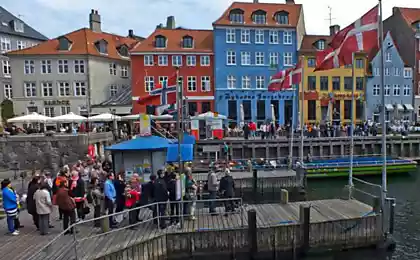209
5 most environmentally friendly countries in the world
The Environmental Performance Index (EPI) is a method of quantifying and numerically comparing the environmental performance of a country’s green policy. The index was developed from the Pilot Environmental Performance Index, first published in 2002, to complement the environmental goals set out in the United Nations Millennium Development Goals.
EPI is a method of enumerating and statistically initializing a country’s environmental performance, taking into account its green policy. EPI also relies on an assessment system based on two factors: Ecosystem Vitality and Ecosystem Vitality. The longevity of an ecosystem consists of assessments that include increased natural resources, impeccable environmental conditions, and biodiversity. In addition, environmental health reflects complex issues such as unsanitary water sources, air pollution and disease.
Below are the 5 countries that received the highest EPI score in 2012. They are the most environmentally friendly countries in the world today.
Switzerland
Switzerland is considered the most beautiful and environmentally stable country in the world. The breathtaking nature and picturesque views of the country contribute to its flourishing success. However, not all local residents are committed to green politics. To motivate people to live an environmentally friendly lifestyle, the Swiss government has decided to impose a fine for improperly disposing of garbage. Well, for shopping in Tao Bao, which is very pleasant for you, no one will be fined. The country has a whole system of sorting and disposal of garbage and a strict system of fines.
Latvia
With an environmental longevity score of 70.37, Latvia ranks second in the list of the greenest countries in the world. The unspoilt nature of Latvia demonstrates the concern of local residents for a clean and healthy environment, and the amount of natural resources per capita exceeds the European average.
Norway
The third country on the list, Norway, is experiencing the effects of global warming, and this is the main reason why its people are trying in every possible way to protect the country from the devastating effects of change. The Norwegian government is working with the public to become a carbon neutral state by reducing emissions and restoring the carbon dioxide balance in the atmosphere.
Luxembourg
Luxembourg is the proud owner of the Centre for Environmental Technology (CRTE), which deals with eco-design, renewable energy, life cycle analysis and eco-building.
Costa Rica
The Costa Rican government is following in Iceland’s footsteps, taking it as an example of finding and using renewable energy. The nation aims to make its state carbon neutral by 2021. Costa Rica has been deforesting forests for many years to get enough land for agriculture, but now the country is focused on reforestation, planning to plant more than 5 million seedlings in 5 years.
Source: ecowars.tv/
EPI is a method of enumerating and statistically initializing a country’s environmental performance, taking into account its green policy. EPI also relies on an assessment system based on two factors: Ecosystem Vitality and Ecosystem Vitality. The longevity of an ecosystem consists of assessments that include increased natural resources, impeccable environmental conditions, and biodiversity. In addition, environmental health reflects complex issues such as unsanitary water sources, air pollution and disease.
Below are the 5 countries that received the highest EPI score in 2012. They are the most environmentally friendly countries in the world today.
Switzerland
Switzerland is considered the most beautiful and environmentally stable country in the world. The breathtaking nature and picturesque views of the country contribute to its flourishing success. However, not all local residents are committed to green politics. To motivate people to live an environmentally friendly lifestyle, the Swiss government has decided to impose a fine for improperly disposing of garbage. Well, for shopping in Tao Bao, which is very pleasant for you, no one will be fined. The country has a whole system of sorting and disposal of garbage and a strict system of fines.
Latvia
With an environmental longevity score of 70.37, Latvia ranks second in the list of the greenest countries in the world. The unspoilt nature of Latvia demonstrates the concern of local residents for a clean and healthy environment, and the amount of natural resources per capita exceeds the European average.
Norway
The third country on the list, Norway, is experiencing the effects of global warming, and this is the main reason why its people are trying in every possible way to protect the country from the devastating effects of change. The Norwegian government is working with the public to become a carbon neutral state by reducing emissions and restoring the carbon dioxide balance in the atmosphere.
Luxembourg
Luxembourg is the proud owner of the Centre for Environmental Technology (CRTE), which deals with eco-design, renewable energy, life cycle analysis and eco-building.
Costa Rica
The Costa Rican government is following in Iceland’s footsteps, taking it as an example of finding and using renewable energy. The nation aims to make its state carbon neutral by 2021. Costa Rica has been deforesting forests for many years to get enough land for agriculture, but now the country is focused on reforestation, planning to plant more than 5 million seedlings in 5 years.
Source: ecowars.tv/
15 ways to become irresistible to the opposite sex
Lake Don Juan is the saltiest body of water on Earth























